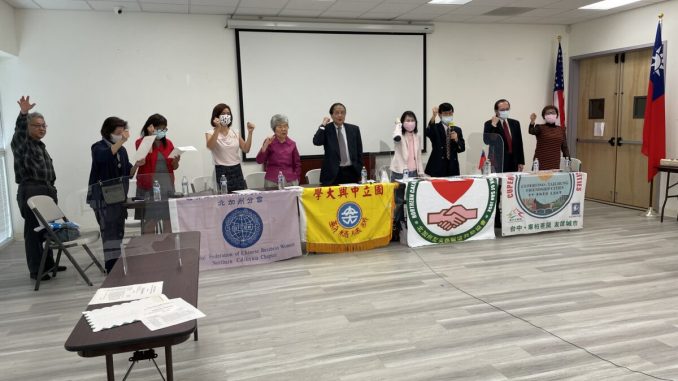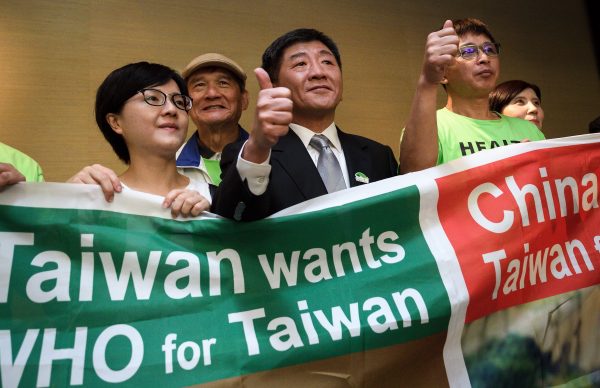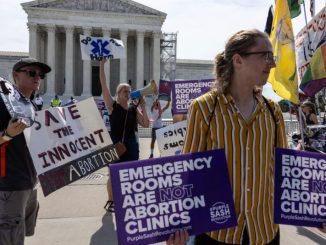
A group of local Taiwanese organizations in California held a press conference on May 18 to urge the World Health Organization (WHO) to allow Taiwan to participate in the upcoming World Health Assembly (WHA). They pointed out that the WHO shouldn’t cave in to pressure from Beijing over discriminating against Taiwan.
The 74th WHA will take place virtually from May 24 to June 1 due to the COVID-19 pandemic. The WHA is the WHO’s decision-making body.
The press conference was held on Tuesday at the Culture Center of Taipei Economic and Cultural Office (TECO) in Milpitas city. The event was attended by local Taiwanese associations and other groups, including the Taiwanese American Center Northern California, Hong’s Foundation, Cupertino-YiLan Friendship City Association, Cupertino-Taichung Friendship City Association, Chung Hsing University Alumni Association Northern California, San Jose Taiwanese Community Care Network, and Taiwan’s Overseas Community Affairs Council.
“This year is critical [for Taiwan to attend the WHA] to prove Taiwan doesn’t belong to China,” said John Tsieh, the host of the press conference and a member of the local Love of Taiwan Association.
Tsieh urged the WHO to recognize Taiwan as a formal member and pointed out that Taipei’s observer status was only created under the political pressure from the Chinese regime.
“[The] Taiwanese deserve to have the basic health rights. The WHO is a world organization, and It should take care of the health and welfare of all people in the world, including [people living in] Taiwan,” said Pingping Lee, adviser to the Cupertino-Taichung Friendship City Association.
Lee asserted, “No discrimination against Taiwan.”
The association is based in Cupertino, a northern California city that has a large Taiwanese population. Cupertino and Taiwan’s Taichung city signed an agreement in October 2016 to become sister cities, which includes a cultural exchange program that solidifies ties between both cities.
Taiwan has been considered as a successful model of stemming the spread of the CCP (Chinese Communist Party) virus, commonly known as the novel coronavirus. The small island, with a population of around 23.5 million, recorded less than 1,200 infection cases as of the end of April. However, a recent outbreak this month saw the number of infections nearly double.
Lee expressed deep concern about the current situation and urged the WHO to allow Taiwan’s participation in the upcoming WHA. She said it is important for the island to have access to WHO’s information system.
Taiwan was previously able to attend the WHA from 2009 to 2016 as an observer, under the name “Chinese Taipei.” At that time, Taiwan had a closer trade relation with China under former President Ma Ying-Jeou.
However, in 2017, Beijing blocked Taiwan from participating in the WHA. The Chinese regime opposes Taiwan’s participation in international bodies because it views the democratic island as part of its territory, even though it has been governed as a distinct entity for more than seven decades. Beijing continues to pressure the WHO and the international community to uphold the “one-China” policy.
Since President Tsai Ing-Wen took office in 2016, Taiwan has distanced itself from mainland China as Tsai continues to stand up against Beijing’s threats.

“I strongly urge the WHO to invite Taiwan to join the World Health Assembly as an observer,” said Teresa Keng at the press conference. Keng is a councilmember of Fremont, another northern California city that has a large Taiwanese community. Keng also serves as an adviser to the Taiwanese Chamber of Commerce of San Francisco Bay Area.
Roy Yen, director of TECO’s culture center in Milpitas, said at the conference, “The virus has no borders … the 23 million people in Taiwan should not be excluded from the WHO due to the political reasons.” He praised the efforts of the local Taiwanese community in lobbying support for Taiwan.
“Please let Taiwan be in the WHA this year. Taiwan can help,” said Catharina Gill, the president of San Jose Taiwanese Community Care Network. Gill is also a commissioner of Taiwan’s Overseas Chinese Affairs Commission.
Gill said Taiwan’s success in dealing with the pandemic in the past 17 months can help WHO’s worldwide operation. She also criticized Beijing’s recent move in preventing Taiwan from obtaining Pfizer and BioNTech’s vaccines.
German company BioNTech worked with with American drugmaker Pfizer in developing the first vaccine approved by the WHO last December. It was widely reported that BioNTech backed out from a $5 million vaccine deal with Taiwan at the last minute. Taiwanese Health Minister Chen Shih-chung said in a radio interview in February that the failure of the deal was due to “political pressure” from China. A spokesperson of China’s Taiwan Affairs Office has denied Beijing’s involvement in the incident.
Earlier this month, the G7 (Group of Seven) countries—the United States, Japan, Britain, France, Germany, Canada, and Italy—have called for Taiwan’s attendance at the WHA. The G7 stated, “ … the international community should be able to benefit from the experience of all partners, including Taiwan’s successful contribution to the tackling of the COVID-19 pandemic.”





Be the first to comment